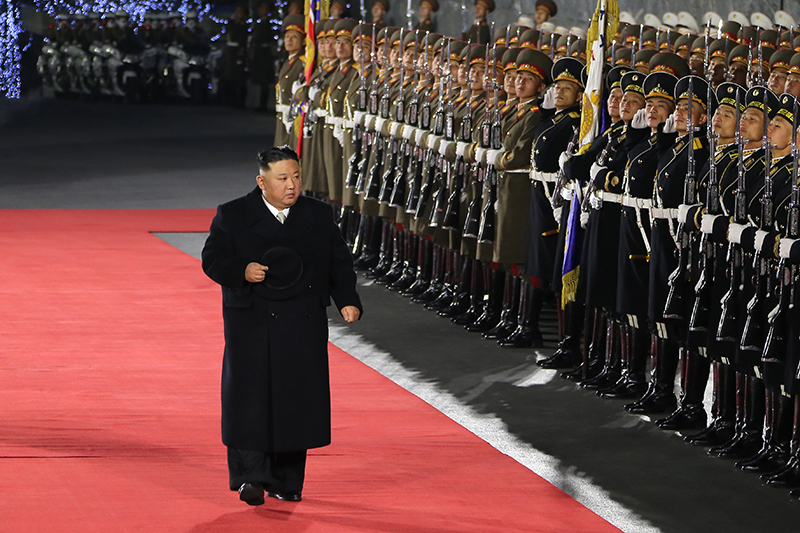|
US remains committed to diplomacy despite North Korea’s nuclear escalation

Kim Jong Un inspecting the KPA Guard of Honour 2.8 2023 (Public Domain)
May 02, 2024 9:49 PM
By Christy Lee
washington —
The U.S. says it has been trying to engage North Korea by sending messages repeatedly despite Pyongyang’s apparent lack of interest in dialogue and its escalation of threats in the region.
“We have sent such messages in multiple ways – through third parties and directly, orally and in writing – and have included specific proposals on humanitarian cooperation and other topics for discussion,” a State Department spokesperson said.
“We have also emphasized our willingness to discuss practical steps both sides could take to address the security situation in the region,” the spokesperson continued via email to VOA’s Korean Service on April 26.
“To date, however, the DPRK has shown no indication it is interested in engaging. Instead, we have seen a marked increase in the scope and scale of DPRK provocations, which have only served to raise regional tensions and increase the risk of accidental or unintentional escalation,” the spokesperson added.
North Korea’s official name is the Democratic People's Republic of Korea.
North Korea has been conducting multiple missile and rocket tests, including what it said was its first nuclear counterattack drills using “super-large” artillery rockets carrying mock nuclear warheads on April 22.
Pyongyang has also ramped up its cooperation with Russia, sending arms to support Moscow's fight against Ukraine. Russia has been shipping refined petroleum to North Korea above the limit of 500,000 barrels annually set by the U.N. Security Council, White House national security spokesperson John Kirby said Thursday.
The North Korean mission to the U.N. did not respond to a VOA inquiry on its reaction to the U.S. description of its efforts made to resume talks.
Dialogue between the two has been deadlocked since October 2019 when working-level talks failed to reconcile differences over denuclearization and sanctions relief that became apparent a few months earlier at a summit in Hanoi.
Washington has maintained that it is open to renewed dialogue on Pyongyang’s nuclear program without preconditions.
Former U.S. officials suggested that the Biden administration provided the unusually detailed account of its efforts to engage Pyongyang in response to criticisms saying it has not done enough.
“The Biden team is quite sensitive to the attacks coming from 'liberals,' especially critics who claim the administration has not attached sufficient priority to North Korea and has not done enough to pursue diplomacy with Pyongyang,” said Evans Revere, a former State Department official with extensive experience negotiating with North Korea.
Revere added that some of these critics are arguing that Washington needs to change its approach, offer concessions and engage in arms control and threat reduction talks with North Korea. He said this explains not only the administration’s detailed description of its efforts at talks but its willingness to discuss “interim steps” toward denuclearization.
Two senior U.S. officials said in March that Washington is willing to consider such steps and discuss sanctions and confidence-building measures.
Robert Rapson, who served as charge d’affaires and deputy chief of mission at the U.S. Embassy in Seoul from 2018 to 2021, said the Biden administration may be trying to address China’s call for talks between Washington and Pyongyang.
“It’s possible Beijing may have laid out a quid pro quo for any support with North Korea by calling on the U.S. to up its efforts to engage with Pyongyang – hence the statement” from the State Department, said Rapson.
Secretary of State Antony Blinken said at a news conference in Beijing after talks with Chinese officials that he “encouraged” Beijing “to press Pyongyang to end its dangerous behavior and engage in dialogue.”
Joseph DeTrani, who served as the special envoy for six-party denuclearization talks with North Korea from 2003 to 2006, said, “The Biden administration wants to make it clear, for the record and as we approach the November presidential election, that the administration was proactive in its policy toward North Korea and they did everything possible” to have Pyongyang “return to negotiations.” Copyright © May 2024 Voice of America. All Rights Reserved.
Back To Country Profile
|